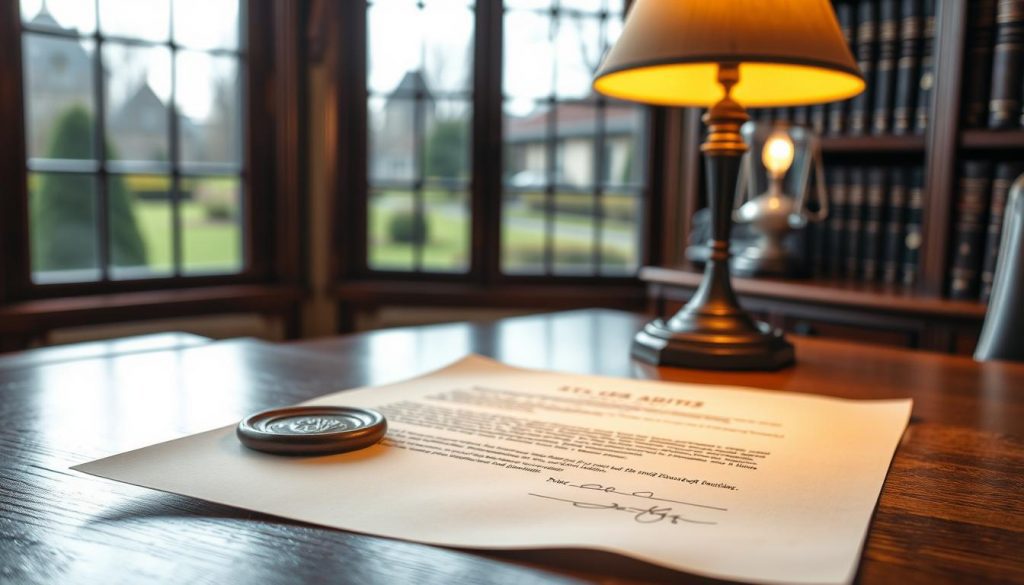When someone dies, their estate planning wishes are carried out according to their will. We understand that this can be a challenging and emotional experience, and we are here to provide clear guidance and support you through this process.
As experienced professionals, we will guide you through what to expect during this process. The will outlines the distribution of their assets, and the executor or administrator is responsible for carrying out the instructions.
For more information on estate planning, we recommend visiting relevant resources to understand the process better.
Key Takeaways
- Understand the role of the executor or administrator in carrying out the will’s instructions.
- Learn about the key steps involved in distributing the deceased’s assets.
- Discover how to navigate potential challenges that may arise during the process.
- Get guidance on how to ensure the deceased’s wishes are carried out according to their will.
- Find out how to access relevant resources for estate planning.
Understanding the Purpose of a Will
Estate planning is a vital process, and at its core lies the will, a document that outlines an individual’s wishes regarding the distribution of their estate. We will explore the significance of a will and its role in ensuring that the deceased person’s wishes are respected and carried out.
What is a Will?
A will, also known as a last will and testament, is a legal document that outlines how a person’s assets should be distributed after their death. It includes details about the distribution of property, money, and other possessions, as well as the appointment of an executor to manage the estate.
Having a will in place is crucial for estate planning, as it provides a clear roadmap for the distribution of assets, reducing the likelihood of disputes and challenges among loved ones.

Importance of a Will in Estate Planning
A will is essential for ensuring that an individual’s wishes are respected and carried out after their passing. It provides a clear and legally binding document that outlines the distribution of assets, reducing the risk of disputes and challenges.
The importance of a will in estate planning can be seen in several key areas:
| Aspect | Description | Benefit |
|---|---|---|
| Distribution of Assets | Outlines how assets are to be distributed | Ensures wishes are respected |
| Appointment of Executor | Names a person to manage the estate | Provides a clear line of authority |
| Guardianship | Appoints guardians for minor children | Ensures the well-being of children |
By having a will, individuals can ensure that their estate is managed and distributed according to their wishes, providing peace of mind for themselves and their loved ones.
Key Terminology Explained
The language used in wills can be complex, so let’s break down the critical terms you need to know.
Executor and Beneficiary
Two crucial roles come into play when a will is read: the executor and the beneficiary. The executor is responsible for carrying out the instructions in the will, managing the estate, and ensuring that the deceased’s wishes are respected. This includes tasks such as gathering in the assets, paying debts, and distributing the remaining assets according to the will.
A beneficiary, on the other hand, is an individual or organization that receives assets or benefits from the estate. Beneficiaries can be family members, friends, or charities, and they are entitled to the assets allocated to them as per the will’s instructions.
Intestate vs. Testate
Understanding whether someone has died intestate or testate is vital in determining how their estate is distributed. If a person dies testate, it means they have left a valid will that outlines how their assets should be distributed. Conversely, dying intestate means that the individual did not leave a valid will, and the distribution of their estate will be governed by the laws of intestacy.
| Status | Definition | Implications |
|---|---|---|
| Testate | Died with a valid will | Estate distributed according to the will |
| Intestate | Died without a valid will | Estate distributed according to the laws of intestacy |
Understanding these key terms and concepts can help you navigate the process of reading a will and managing the estate of a loved one. It’s also essential to be aware of the executor’s duties and the rights associated with being a beneficiary or an executor.
The Process of Reading a Will
The process of reading a will is a significant step in the deceased estate settlement, requiring careful attention to detail. When a loved one passes away, their will becomes a crucial document that outlines their wishes regarding the distribution of their assets.
Where to Find the Will
Locating the will is the first step in the probate process. Typically, the will can be found among the deceased person’s important documents, such as in a safe or a filing cabinet. It’s also possible that the deceased may have left the will with their solicitor or stored it in a secure location, such as a bank vault.
We recommend conducting a thorough search of the deceased’s personal belongings and contacting their legal advisor or financial institution to determine if they have a will in their possession.
Documents Required to Access the Will
To access the will, certain documents are required. These typically include the death certificate, identification of the deceased, and any other relevant paperwork. The executor named in the will will need to gather these documents to proceed with the probate process.
The necessary documents may vary depending on the complexity of the estate and the specific requirements of the jurisdiction. We advise consulting with a legal professional to ensure all necessary documents are in order.
By understanding where to find the will and the documents required to access it, you can navigate the initial stages of the probate process with greater ease and confidence.
Who is Present at the Reading?
During the reading of a will, several key individuals are typically present to ensure the process is carried out smoothly. This gathering is crucial for the orderly distribution of the deceased’s assets.
Family Members and Beneficiaries
Family members and beneficiaries are usually the primary individuals present during the reading of a will. These are the people who will be directly affected by the contents of the will, as they are either receiving assets or being named in the deceased’s final wishes. It’s essential for them to be present to understand their entitlements and any conditions attached to their inheritance distribution.
Legal Representatives
Legal representatives, such as solicitors or lawyers, play a vital role in the reading of a will. They are responsible for ensuring that the will is read accurately and that the deceased’s wishes are carried out in accordance with the law. Their presence provides guidance and support to family members and beneficiaries, helping to clarify any legal jargon and explaining the implications of the will’s contents regarding their legal heirs entitlement.
The presence of legal representatives ensures that the inheritance distribution is handled according to the deceased’s wishes and legal requirements. This helps in preventing any potential disputes among the beneficiaries and ensures a smooth transition of assets.

Understanding the Legal Framework
Understanding the legal framework of a will is vital for ensuring that the deceased’s wishes are respected and carried out correctly. The legal framework provides the structure within which a will is executed, and it involves several key components.
The Role of Probate
Probate is a critical process in the administration of a deceased person’s estate. It involves verifying the will and granting the executor the authority to manage the estate according to the deceased’s wishes. The probate process can vary significantly depending on the jurisdiction, so it’s essential to understand the specific requirements in the UK.
During probate, the executor is tasked with gathering the deceased’s assets, paying off any debts, and distributing the remaining assets to the beneficiaries as specified in the will. This process is overseen by the court to ensure that it is carried out fairly and in accordance with the law.

Relevant Laws in the UK
The laws governing probate and estate administration in the UK are primarily based on the Administration of Estates Act 1925 and the Trusts of Land and Appointment of Trustees Act 1996. These laws outline the procedures for probate, the responsibilities of executors, and the rights of beneficiaries.
| Legislation | Purpose | Key Provisions |
|---|---|---|
| Administration of Estates Act 1925 | Governs the administration of estates | Outlines the process for probate, executor’s duties, and distribution of assets |
| Trusts of Land and Appointment of Trustees Act 1996 | Regulates trusts and trustees | Provides guidelines on the appointment of trustees and the management of trust land |
Understanding these laws is crucial for navigating the probate process effectively. We recommend seeking professional advice to ensure compliance with all relevant legal requirements.
How to Prepare for the Reading
After the loss of a loved one, preparing for the reading of their will involves several important steps that beneficiaries should be aware of. Being prepared not only ensures a smoother process but also helps in understanding the legal and emotional implications involved.
Gathering Necessary Information
To prepare for the reading of the will, beneficiaries should gather necessary documentation and identification. This may include:
- Proof of identity (e.g., passport, driving licence)
- Documents related to the deceased’s estate (e.g., property deeds, bank statements)
- Any relevant legal documents (e.g., previous wills, divorce or marriage certificates)
Gathering this information in advance can help streamline the process and reduce delays.

Understanding Your Rights as a Beneficiary
Beneficiaries have specific rights during the process of reading a will and the subsequent distribution of the estate. Understanding these rights is crucial:
- Right to Information: Beneficiaries are entitled to receive information about the estate’s assets and liabilities.
- Right to Challenge: If a beneficiary believes the will is not valid or does not accurately reflect the deceased’s wishes, they have the right to contest it.
- Right to Representation: Beneficiaries can seek legal representation to protect their interests during the probate process.
Being aware of these rights can help beneficiaries navigate the process more effectively and ensure their interests are protected.
Common Emotions During the Reading
The reading of a will is a significant event that can trigger a range of feelings, from sadness and grief to anxiety about the future. It’s a moment when the deceased’s wishes regarding inheritance distribution become clear, which can sometimes lead to tension among family members.
As we navigate this challenging time, it’s essential to acknowledge the emotional weight of the experience. The loss of a loved one is never easy, and the added complexity of understanding one’s legal heirs entitlement can be overwhelming.
Dealing with Grief
Grief is a natural response to loss, and it’s crucial to allow yourself the time and space to process your emotions. We recommend seeking support from family, friends, or professional counsellors if the grief feels unmanageable. Remember, everyone grieves differently, and there’s no set timeline for healing.
During this period, it’s also important to be patient with others who may be grieving in their own way. The emotional dynamics at play can be complex, and understanding that everyone copes differently can help in managing these interactions.
Managing Family Dynamics
Family dynamics can become particularly sensitive during the reading of a will, especially when it comes to understanding the distribution of assets. It’s not uncommon for disagreements to arise regarding the deceased’s decisions.
To manage these dynamics effectively, we suggest maintaining open lines of communication and seeking legal advice if disputes arise. Understanding your rights as a beneficiary or legal heir can also help in navigating any potential conflicts.
In some cases, the emotional strain can be significant, and it’s crucial to prioritize your well-being. Seeking support from professionals who can offer guidance on both the emotional and legal aspects can be invaluable.
As you move forward, we are here to support you through this challenging time, providing the necessary resources to manage your emotions and make informed decisions regarding the estate.
The Contents of a Will
A will is more than just a legal document; it’s a reflection of the deceased person’s wishes regarding their estate and loved ones. When someone passes away, their will outlines how their assets should be distributed and any special instructions they may have left.
Distribution of Assets
The distribution of assets is a critical component of a will. This includes property, money, and other possessions that the deceased person wants to leave to specific individuals or organizations. The will typically names beneficiaries who will receive these assets, ensuring that the deceased person’s wishes are respected during the deceased estate settlement process.
It’s essential to understand that the distribution of assets can be influenced by various factors, including the deceased person’s financial situation, family dynamics, and any outstanding debts or taxes.
Special Instructions and Wishes
Apart from distributing assets, a will may also include special instructions or wishes that the deceased person wants to be carried out. These can range from funeral arrangements to the care of minor children or pets. Such instructions provide guidance to the executor of the will, ensuring that the deceased person’s estate planning wishes are fulfilled.
For instance, a will might specify that certain personal items be given to particular individuals as a way of honoring memories or maintaining family heirlooms.
Understanding the contents of a will is crucial for all parties involved in the estate settlement process. It not only provides clarity on the distribution of assets but also sheds light on any special wishes the deceased person may have had.
The Role of the Executor
Understanding the role of an executor is essential for anyone who has been named as one or is dealing with the estate of a loved one. The executor is responsible for carrying out the instructions in the will, which includes managing the estate and distributing assets to the beneficiaries.
Responsibilities and Duties
The executor’s duties are multifaceted and require a high level of responsibility. Some of the key tasks include:
- Managing the estate’s assets, which may involve selling or transferring property.
- Paying off debts and taxes owed by the deceased.
- Distributing the remaining assets according to the instructions in the will.
- Ensuring that all legal and administrative tasks are completed.
For a detailed overview of the executor’s duties, you can refer to resources such as LegalZoom’s article on the top 10 duties of an. This can provide valuable insights into the complexities of the role.
How Executors are Chosen
Typically, the deceased person chooses their executor when they make their will. The choice is often based on trust, as the executor needs to be someone who can manage the estate fairly and according to the deceased’s wishes. Commonly, executors are family members, close friends, or professionals such as solicitors.
It’s crucial for the chosen executor to understand their executor duties and the rights they have under the will, known as will executor rights. This knowledge helps in carrying out their responsibilities effectively and ensuring that the estate is managed in accordance with the deceased’s intentions.
In summary, the role of the executor is pivotal in the administration of a deceased person’s estate. By understanding their responsibilities and duties, executors can fulfill their role effectively, ensuring that the wishes of the deceased are respected and carried out.
Possible Disputes and Challenges
Understanding the potential disputes that can arise during the probate process is essential for navigating the complexities of estate administration. When a will is read, the contents can sometimes lead to disagreements among family members and beneficiaries.
Common Reasons for Will Contests
Will contests can arise due to various reasons, including:
- Concerns about the validity of the will, such as allegations of undue influence or lack of testamentary capacity.
- Disagreements over the distribution of assets, particularly if beneficiaries feel that the distribution is unfair.
- Questions about the appointment of the executor, potentially leading to disputes about who should administer the estate.
For instance, if a family member feels that the deceased was under undue influence when making the will, they may contest it. It’s essential to understand that the probate process involves legal complexities that can lead to such disputes.
How to Resolve Disputes
Resolving disputes during the probate process requires a careful and considered approach. Here are some steps that can be taken:
- Mediation: Engaging a neutral third-party mediator can help resolve disputes without resorting to litigation.
- Negotiation: Beneficiaries and executors can negotiate agreements that satisfy all parties involved.
- Legal Action: In some cases, it may be necessary to seek legal resolution through the courts.
It’s crucial to approach disputes with sensitivity and a willingness to understand different perspectives. By doing so, it’s possible to resolve conflicts in a way that respects the wishes of the deceased while also considering the needs of the beneficiaries.
Next Steps After the Reading
Once the will is read, beneficiaries can expect the executor to take several key actions. The executor’s role is pivotal in ensuring that the deceased’s wishes are carried out as stated in the will.
Understanding the Executor’s Next Actions
The executor’s next steps are crucial in the estate administration process. These steps typically include:
- Validating the will: Ensuring the will is genuine and legally binding.
- Managing the estate: This includes gathering in the assets, paying debts, and dealing with tax obligations.
- Distributing the inheritance: Following the instructions left in the will.
As stated by the Society of Trust and Estate Practitioners (STEP), “The executor’s role is to act in the best interests of the estate and its beneficiaries, ensuring that the deceased’s wishes are respected and carried out.”
“Executors have a fiduciary duty to act impartially and with care, skill, and diligence in administering the estate.”
Timeframes for Distribution
The timeframe for distributing the inheritance can vary significantly depending on the complexity of the estate. Simple estates with few assets and no disputes can be settled relatively quickly, often within a few months. However, more complex estates involving multiple assets, businesses, or disputes can take longer, sometimes extending to a year or more.
| Estate Complexity | Typical Timeframe |
|---|---|
| Simple Estates | 3-6 months |
| Moderate Estates | 6-12 months |
| Complex Estates | 1-2 years or more |
Beneficiaries should be aware that the executor must follow legal procedures and may need to wait for certain permissions before distributing assets. As the executor navigates these processes, they must also keep beneficiaries informed about the progress and any significant developments.
Understanding the next steps after the reading of the will can help beneficiaries prepare for what lies ahead. By knowing what to expect, beneficiaries can better navigate the process and plan accordingly.
Resources for Further Support
Beneficiaries and executors often require additional guidance during the probate process. We understand the importance of having the right support to navigate the complexities of estate planning and legal heirs entitlement.
Seeking Professional Advice
For expert legal advisory services, consider consulting a solicitor specializing in estate planning. They can provide personalized guidance on managing the estate and ensuring that the deceased’s wishes are respected.
Emotional Support Options
Coping with the loss of a loved one can be challenging. Support groups and counselling services can offer emotional support during this difficult time. These resources can help individuals process their grief and adjust to the changes following a bereavement.
By accessing these resources, beneficiaries and executors can better navigate the probate process, ensuring that they receive the support they need to manage their responsibilities effectively.


